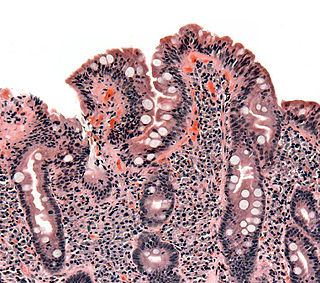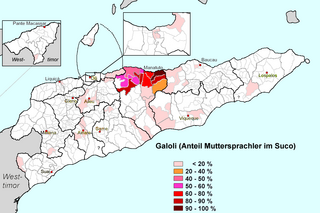This article relies largely or entirely on a single source .(July 2022) |
The Attie are an Akan people who live predominantly in Ivory Coast. [1]
This article relies largely or entirely on a single source .(July 2022) |
The Attie are an Akan people who live predominantly in Ivory Coast. [1]

Bipolar disorder, previously known as manic depression, is a mood disorder characterized by periods of depression and periods of abnormally-elevated happiness that last from days to weeks each. If the elevated mood is severe or associated with psychosis, it is called mania; if it is less severe, it is called hypomania. During mania, an individual behaves or feels abnormally energetic, happy or irritable, and they often make impulsive decisions with little regard for the consequences. There is usually also a reduced need for sleep during manic phases. During periods of depression, the individual may experience crying and have a negative outlook on life and poor eye contact with others. The risk of suicide is high; over a period of 20 years, 6% of those with bipolar disorder died by suicide, while 30–40% engaged in self-harm. Other mental health issues, such as anxiety disorders and substance use disorders, are commonly associated with bipolar disorder.

Leukemia is a group of blood cancers that usually begin in the bone marrow and result in high numbers of abnormal blood cells. These blood cells are not fully developed and are called blasts or leukemia cells. Symptoms may include bleeding and bruising, bone pain, fatigue, fever, and an increased risk of infections. These symptoms occur due to a lack of normal blood cells. Diagnosis is typically made by blood tests or bone marrow biopsy.

The Second Amendment to the United States Constitution protects the right to keep and bear arms. It was ratified on December 15, 1791, along with nine other articles of the Bill of Rights. In District of Columbia v. Heller (2008), the Supreme Court affirmed for the first time that the right belongs to individuals, for self-defense in the home, while also including, as dicta, that the right is not unlimited and does not preclude the existence of certain long-standing prohibitions such as those forbidding "the possession of firearms by felons and the mentally ill" or restrictions on "the carrying of dangerous and unusual weapons". In McDonald v. City of Chicago (2010) the Supreme Court ruled that state and local governments are limited to the same extent as the federal government from infringing upon this right.

Coeliac disease is a long-term autoimmune disorder, primarily affecting the small intestine, where individuals develop intolerance to gluten, present in foods such as wheat, rye and barley. Classic symptoms include gastrointestinal problems such as chronic diarrhoea, abdominal distention, malabsorption, loss of appetite, and among children failure to grow normally. This often begins between six months and two years of age. Non-classic symptoms are more common, especially in people older than two years. There may be mild or absent gastrointestinal symptoms, a wide number of symptoms involving any part of the body, or no obvious symptoms. Coeliac disease was first described in childhood; however, it may develop at any age. It is associated with other autoimmune diseases, such as Type 1 diabetes mellitus and Hashimoto's thyroiditis, among others.

LGBT is an initialism that stands for lesbian, gay, bisexual, and transgender. In use since the 1990s, the initialism, as well as some of its common variants, functions as an umbrella term for sexuality and gender identity.
Roe v. Wade, 410 U.S. 113 (1973), was a landmark decision of the U.S. Supreme Court in which the Court ruled that the Constitution of the United States generally protects the liberty to choose to have an abortion. The decision struck down many federal and state abortion laws, and fueled an ongoing abortion debate in the United States about whether, or to what extent, abortion should be legal, who should decide the legality of abortion, and what the role of moral and religious views in the political sphere should be. The decision also shaped debate concerning which methods the Supreme Court should use in constitutional adjudication.

Colorectal cancer (CRC), also known as bowel cancer, colon cancer, or rectal cancer, is the development of cancer from the colon or rectum. Signs and symptoms may include blood in the stool, a change in bowel movements, weight loss, and fatigue.

Non-binary or genderqueer is an umbrella term for gender identities that are not solely male or female—identities that are outside the gender binary. Non-binary identities fall under the transgender umbrella, since non-binary people typically identify with a gender that is different from their assigned sex, though some non-binary individuals do not consider themselves transgender.
Loving v. Virginia, 388 U.S. 1 (1967), was a landmark civil rights decision of the U.S. Supreme Court in which the Court ruled that laws banning interracial marriage violate the Equal Protection and Due Process Clauses of the Fourteenth Amendment to the U.S. Constitution. Beginning in 2013, it was cited as precedent in U.S. federal court decisions holding restrictions on same-sex marriage in the United States unconstitutional, including in the 2015 Supreme Court decision Obergefell v. Hodges.
This gallery of sovereign state flags shows the national or state flags of sovereign states that appear on the list of sovereign states. For other flags, please see flags of active autonomist and secessionist movements, flags of extinct states and gallery of flags of dependent territories. Each flag is depicted as if the flagpole is positioned on the left of the flag, except for those of the Islamic Emirate of Afghanistan, Iran, Iraq, and Saudi Arabia, which are depicted with the hoist to the right.

The Galoli, or Galolen, are a people of East Timor with a population of about 50,000, primarily along the northern coast of the district of Manatuto. To the west lies the Mambai people. There is an old colony on the southern coast of Wetar island, the Talo, who speak the Talur dialect.

Human immunodeficiency virus infection and acquired immunodeficiency syndrome (HIV/AIDS) is a spectrum of conditions caused by infection with the human immunodeficiency virus (HIV), a retrovirus. Following initial infection an individual may not notice any symptoms, or may experience a brief period of influenza-like illness. Typically, this is followed by a prolonged incubation period with no symptoms. If the infection progresses, it interferes more with the immune system, increasing the risk of developing common infections such as tuberculosis, as well as other opportunistic infections, and tumors which are otherwise rare in people who have normal immune function. These late symptoms of infection are referred to as acquired immunodeficiency syndrome (AIDS). This stage is often also associated with unintended weight loss.

Amyotrophic lateral sclerosis (ALS), also known as motor neuron disease (MND) or Lou Gehrig's disease, is a neurodegenerative disease that results in the progressive loss of motor neurons that control voluntary muscles. ALS is the most common type of motor neuron disease. Early symptoms of ALS include stiff muscles, muscle twitches, and gradual increasing weakness and muscle wasting. Limb-onset ALS begins with weakness in the arms or legs, while bulbar-onset ALS begins with difficulty speaking or swallowing. Half of the people with ALS develop at least mild difficulties with thinking and behavior, and about 15% develop frontotemporal dementia. Most people experience pain. The affected muscles are responsible for chewing food, speaking, and walking. Motor neuron loss continues until the ability to eat, speak, move, and finally the ability to breathe is lost. ALS eventually causes paralysis and early death, usually from respiratory failure.

Jim Crow laws were state and local laws enforcing racial segregation in the Southern United States. Other areas of the United States were affected by formal and informal policies of segregation as well, but many states outside the South had adopted laws, beginning in the late 19th century, banning discrimination in public accommodations and voting. Southern laws were enacted in the late 19th and early 20th centuries by white Southern Democrat–dominated state legislatures to disenfranchise and remove political and economic gains made by African Americans during the Reconstruction period. Jim Crow laws were enforced until 1965.

Transgender people have a gender identity or gender expression that differs from the sex that they were assigned at birth. Some transgender people who desire medical assistance to transition from one sex to another identify as transsexual. Transgender, often shortened as trans, is also an umbrella term; in addition to including people whose gender identity is the opposite of their assigned sex, it may also include people who are non-binary or genderqueer. Other definitions of transgender also include people who belong to a third gender, or else conceptualize transgender people as a third gender. The term transgender may be defined very broadly to include cross-dressers. The term transgender does not have a universally accepted definition, including among researchers.

The COVID-19 pandemic, also known as the coronavirus pandemic, is a global pandemic of coronavirus disease 2019 (COVID-19) caused by severe acute respiratory syndrome coronavirus 2 (SARS-CoV-2). The novel virus was first identified from an outbreak in Wuhan, China, in December 2019. Attempts to contain it there failed, allowing the virus to spread worldwide. The World Health Organization (WHO) declared a Public Health Emergency of International Concern on 30 January 2020 and a pandemic on 11 March 2020. As of 7 July 2022, the pandemic had caused more than 552 million cases and 6.34 million confirmed deaths, making it one of the deadliest in history.

Coronavirus disease 2019 (COVID-19) is a contagious disease caused by a virus, the severe acute respiratory syndrome coronavirus 2 (SARS-CoV-2). The first known case was identified in Wuhan, China, in December 2019. The disease spread worldwide, leading to the COVID-19 pandemic.
The COVID-19 vaccination campaign in Greece began on 27 December 2020. As of the 30th of June 2022, 7.919.254 people have received their first dose, and 7.629.060 people have been fully vaccinated. A total of 6.119.231 people have received an additional booster shot.
The COVID-19 vaccination campaign in Turkey began on 14 January 2021. As of 2 April 2022, 57.784.362 people have received their first dose, and 52.982.877 people have been fully vaccinated. Also, 27.648.857 people received their third dose.

Stemirna COVID-19 vaccine is a COVID-19 vaccine candidate developed by Stemirna Therapeutics.